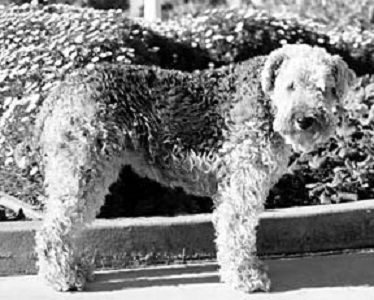Despite a ravenous appetite, Zack the Australian Shepherd becomes ill when he tries to eat a regular meal. A year ago he was chubby, but now his ribs show through a perpetually shedding coat of dull, dry fur. Zack’s bowel movements are irregular, too. Last week he had diarrhea, but today he is constipated. He might not go potty again for several days, and when he finally does, his elimination will probably be strained, his stool covered with mucus and streaked with blood. Like thousands of other dogs, Zack suffers from a concurrence of symptoms known as inflammatory bowel disease, or IBD. All cases of IBD share one sign – chronic inflammation in the intestinal tract – but no two cases are identical. Common symptoms include diarrhea, labored or painful bowel movements, gastric distention, rectal bleeding, and mucus discharge. Inexplicable weight loss, indigestion, vomiting, and even chronic flatulence may also point to IBD. Because the causes of IBD are often multi-faceted and difficult to pinpoint, finding an effective treatment for the disease can be challenging – for even the most experienced veterinarian. Immune system disorders, circulatory impairment in the intestinal tract, parasitic infections, defects in permeability of the intestinal wall, dietary sensitivities or food allergies, adverse drug reactions (such as with large doses of aspirin), and prolonged use of antibiotic or antiparasitic drugs are among the many possible causes and contributing factors. Conventional approaches to inflammatory bowel disease often involve a controlled diet of highly digestible foods that are rich in supplemental dietary fiber. Often, cortico-steroid drugs (such as Prednisone) and other immunosuppressive drugs are prescribed to rapidly reduce pain and inflammation. These drugs may bring fast, temporary relief from painful symptoms, but they can be risky, especially if employed long-term. Corticosteroid drugs work their magic by inhibiting the immune functions that trigger inflammation – meaning they work against the body’s innate defense mechanisms. During the time that the inflammatory response is shut down, the underlying causes of IBD remain unchecked. And because IBD is often linked to preexisting immune system dysfunction in the first place, long-term corticosteroid therapies can actually add to the complication of an already complex state of immune-mediated disease.
Change Your Dog’s Diet First
Rather than focusing on the symptoms of IBD, the holistic herbalist’s approach centers on identifying and correcting underlying imbalances and influences that may cause or contribute to IBD. The first step is to optimize the diet for maximum digestion and improved waste elimination. Poor quality food ingredients and fillers, such as meat by-products, corn, wheat hulls, and other grains, should be replaced with a home-prepared diet of fresh meats and vegetables. At the very least, bargain brand foods should be replaced with a premium quality canned food or kibble. Food allergies or intolerances are often at the root of IBD. Therefore, the dog’s diet should be critically assessed for possible food culprits. Start by eliminating preservatives, artificial colorings and flavorings, and anything thing else not recognizable as “good, healthy food” from the food dish. Bring the diet to life. Digestive enzymes and a probiotic (beneficial bacteria) supplement are strongly indicated for the IBD sufferer, as these measures will aid digestion, absorption of nutrients, and efficient waste elimination. Follow the manufacturer’s recommendations for how much to feed. Many dogs with IBD will make a special effort to eat grass. I see this as a normal, intuitive effort to provide the digestive tract with the long fiber that is needed to cleanse and nourish the stomach and colon. Provided the grass is clean, green, and tender, this behavior should probably be honored. However, keep a close eye on exactly what he eats; some types of wild grasses are very tough and difficult to digest, and can add to the irritation of IBD. Likewise, it is important to make certain that the grass your companion eats has not been sprayed with herbicide or any other type of lawn care chemical. If your dog insists on eating every blade of grass in sight, try buying some live wheatgrass from the health food store and placing the container next to his food dish. Just be aware that his inner cleansing program might include vomiting and regurgitation. Also consider adding a pinch of finely ground flax seed or psyllium husks to each meal, as this will help soften the stool and ease passage of rough particles. An assortment of other supplements may also be useful toward healing and strengthening mucous tissues in the intestines. These include N-acetyl glucosamine, glutamine, proanthocyanidin complex, dimethylglycine, and vitamin C (calcium ascorbate). Consult your veterinarian to determine which ones may be appropriate for your dog.
Environmental Causes of IBD in Dogs
Toxic chemicals – such as lawn fertilizers, floor cleaners, harsh laundry detergents, pesticides, and motor oil – should be removed from your dog’s environment. Remember, as your dog walks, rolls, and plays in her environment, she picks up whatever residues exist there, and then licks it off her feet and coat. Although invisible and odorless, chemical residues may alter the functional abilities of mucous membranes and adversely affect beneficial bacteria that protect and serve digestive functions in the gut. Use of oral antibiotics should be critically reconsidered and discussed with your veterinarian, as these drugs may inhibit reproduction and the protective capacities of beneficial bacteria in the intestine. Vaccinations should also be reevaluated, as they can have adverse effects upon the immune system – especially one that is already stressed or dysfunctional.
A Formula for Dogs With Inflammatory Bowel Disease
Combine the following teas, tinctures, or dried herbs: ■ 2 parts marshmallow root ■ 1 part slippery elm (powdered inner bark) ■ 1 part plantain leaf ■ 1 part licorice root Dogs over 30 lbs: 1 tablespoon of the dried, powdered herbs, or 1 ml of a low-alcohol tincture combination fed twice daily. For smaller dogs, cut these measures in half. EDITOR’S NOTE: Author Greg Tilford is CEO of Animal’s Apawthecary, a manufacturer of glycerin-based herbal tinctures for animals. Animal’s Apawthecary does make a commercial product (“Phyto-mucil”) formulated to these specifications. However, Tilford stresses that interested dog owners can easily prepare the formula themselves, using fresh or dried organic herbs.
Herbs for IBD Relief, Explained
The symptoms of inflammatory bowel syndrome can often be relieved with the use of herbs that reduce inflammation and help lubricate, nourish, and promote healing of mucous membranes. At the very top of my list of favorites is a combination formula of marshmallow root, slippery elm bark, plantain leaf, and licorice root. I use this formula in an alcohol-free, glycerin-based tincture, but it can be used in powder form as well. The main component of this formula is marshmallow root (Althea officinalis). Marshmallow root is rich with mucilage – a gooey, slippery, water-soluble substance that has a consistency similar to gear oil. While it is being digested, this mucilage helps nourish intestinal flora while providing a soothing, lubricating, protective barrier between inflamed mucous membranes and food materials that are moving through the intestine. Marshmallow root may also help fight infection, as the herb is active against pathogens such as Pseudomonas aeruginosa, Proteus vulgaris, and Staphylococcus aureus. Marshmallow also stimulates the activities of fixed macrophages – immune warriors that serve as a first line of defense in the gut. Slippery elm (Ulmus fulva), the second herb in my IBD formula, is also rich with nutrient-rich mucilage, but it also possesses an assortment of starches and tannin constituents that offer mild astringent qualities. This serves to moderate the excess transport of fluids across intestinal barriers while providing an added measure of lubrication for improved stool elimination. In other words, slippery elm can help reduce diarrhea, which is caused by excess fluid entering the intestine, and can also help relieve the opposite – constipation. Plaintain leaf (Plantago spp.), the third component of the formula, is a ubiquitous weed with dark green, fibrous leaves. It also contains mucilage and tannin constituents, and is often used by herbalists as an earth-friendly alternative to slippery elm. However, plantain leaf provides measures of systemic support that slippery elm and marshmallow root cannot; it is loaded with antioxidant chlorophyll, fiber, and a very rich assortment of vitamins and minerals, all of which are beneficial in the healing and maintenance of mucous membranes and healthy flora. Finally, to round out my favorite herbal formula for IBD, a measure of licorice root (Glycyrhizza glabra) is added. Licorice root is well known by herbalists as a powerful anti-inflammatory, immune stimulant, vulnerary (speeds healing), antimicrobial herbal medicine that is remarkably effective in the digestive tract. It is especially useful for healing ulceration of the stomach and reducing the gastric acid secretions that often contribute to the severity of ulcers and IBD. Part of licorice’s amazing healing ability in the gut can be attributed to its glycyrrhizin content. Glycyrrhizin’s chemical structure is similar to anti-inflammatory corticoids that are naturally produced in the body. The herb contains several other saponin constituents, as well. These soap-like compounds are capable of penetrating deep into mucous membranes to allow better transport of vital nutrients across impaired mucosal barriers and into the body system, where they are needed. This penetrating action also aids in the delivery of other medicinal components of the IBD formula. Although long-term use of licorice root extract may carry adverse side effects of water retention and elevated blood pressure, this is seldom a worry in cases where the herb is used as a small component of a multi-herb formula like this one.
IRRITABLE BOWEL DISEASE IN DOGS: OVERVIEW
1. Improve your dog’s diet. Look for foods he digests easily, avoiding those containing artificial preservatives and colors, and grainbased fillers. 2. Improve digestion and waste elimination with probiotic and enzyme supplements. 3. Talk to a holistic vet about alternatives to conventional wormers and antibiotics. Ask for a reassessment of your dog’s vaccination program. 4. Do not feed rawhide chews, baked bones, or any type of treat that contains smoke flavoring — all of these can irritate inflamed mucous membranes. 5. Clean up your dog’s living and playing environments. Prohibit grass-eating from areas that may have been sprayed with chemical fertilizers or herbicides. 6. If your dog’s daily raw bone causes IBD flare-ups, replace it with a finely powdered calcium supplement added to wet food. This will be much less irritating and easier for him to digest and absorb. Greg Tilford serves as a consultant and formulator to hundreds of holistic veterinarians throughout the world, and is CEO of Animal’s Apawthecary, a company that develops herbal products specifically for use in animals. Tilford is also author of four books on herbal medicine, including All You Ever Wanted to Know About Herbs for Pets, (Bowtie, 1999).







Hello!
I’ve just read your article and you gave me a lot of good informations for starting a new treatment for my dog.
My dog started to have diarrhea ( watery diarrhea) and the veterinarians gave him a lot of antibiotics shots ( almost 2 months) and the diagnostic was pancreatitis. They gave him a lot of antibiotics shots for almost 2 months. He didn’t respond well to these and he still had diarrhea and lost a lot of weight. His weight used to be around 60 kilos and in January his weight was about 30 kilograms. After an ultrasound they told me that he has been diagnosed with IBD in January, after 3 months of diarrhea, and he has taken Prednisone since January.
The veterinarian told me to change his food and to give him something to eat that he has never eaten before…. I stopped to give him dry food ( all contains salt and many bad things) and I gave him sweet potatoes, carrots, veal and pasta ( durum wheat) .
The veterinarian did some blood tests for him last week and his results are good except the one for the liver ( because of the prednisone) and the veterinarian took him an ultrasound too and the intestines look good now .
I want to stop giving him prednisone because I know the slide effects of it and I want to try your remedy.
Do you know that there are some slide effects of it?
I really want to quit prednisone because he has no muscular tone anymore, he pees a lot and he doesn’t feel good ( he is very apathetic). I’m more than sure that the veterinarians “ helped “ him with those antibiotics….
Do you think that there is a problem to start giving him your treatment after what I’ve told you about him?
Thank you in advance.
Hello Oana Sacha,
I want to apologize en advance for my bad English, but I want to help you with your dog. My dog Kocki was the same (IBD) . I changed the food and I’m giving him dry food but it’s raw goat and vegetables cold tried and pressed without any chemical. There are other ingredients too but only natural ones. I’m giving this with the follow supports:
1 Probiotics 50.000 000 bacteria
¾ I-glutamin
¼ Becozym C strong
1/3 Pancreoflat
5 drops of Heliocrisi with Echinacea
1 teaspoon of the tried herbal mix here indicated
My dog’s weight is 12 kg. you have to adequate.
All this once the day
Since I’m giving this, my dog is happy and very changed.
I wish you luck.
Cristina
forgot:
I always put some cooked vegetable (carrots, zucchini, beet roots, spinach) and water over the dry food and once or twice the week some cooked turkey meat. I’m feeding this for most of a month and my dog has put on weight and is very healthy. He hadn’t hat any diarrhea after two days yet I changed the food.
Hi
My dog was just diagnosed with
IBD
She is 11 years old pitbull
She’s really skinny and has soft stool and sometimes diarrhea
I feed her taste of the wild salmon and looking into changing her food but not sure what is best to feed her what do you guys suggest for a pitbull that’s 50 pounds
My vet has not diagnosed my dog. She thought bushings or andirons but his cortisol was high so thats not it. I have been saying IBD but she cannot confirm.
He is on 4 months of chronic diarrhea, antibiotics of many. Now to be on Predisone which I suggested and she agreed to. My baby has dropped half of his weight and is now getting pressure sores. He is laying most his days and I have to hand feed him to get him to eat. He loves his RUFF BAR protein bars. I mean Love!! I bought some raw fish dog food by Stella and Chewy and he liked it but has to be in the mood for it, hand feed oatmeal. He is very picky what he eats and I need help!! Your Help people. How did they diagnose your dog with IBD? I would love a diagnoses! I know its in the intestine but what? My dog looks like death! I have my beautiful 10 year old Aussie who just lays and stares out into the room. Lost all his love for life unless I say Treat and he know the Ruff Bar is close!! Please send advise and Hope❤️🐶♥️
It is hard to diagnose IBD. Were all other causes of diarrhea rule out ? pancreas, sick liver parasites? If antibiotics and prednisone didnt’ help there is not much left. Licorice root is a wonderful herb, try to make infusion and give your dog with syringe a few teaspoons daily.( licroice enhances some actions of oral corticosteroids so give smaller dose of drug then) Try also teas from ,blackberry leaf or better from herb called in Latin “Potentilla erecta ” (or Tormentilla erecta, ) very good herb for diarrhea.Try chamomile and mint teas for better digestion. Also try agrimony ( Agrimonia eupatoria ) -good for pancreas and liver. All herbs only in weak infusions(teas). Do not mix powdered herbs with food. just teas.Try oregon grape tincture ( Mahonia Aguifolium)- carefully! You can also try monarda (bee balm ) tea. Do not feed raw.I would stick to rice and turkey only ,home made diet.
Hi Patti. I hope your dog is doing well. My dog also has ibd. He is starting to bounce around again though. He was quite ill for a time. I know every dog is different but the grains in dog food seems to be getting him ill. His bowel problems had been going on for about a year. Sometimes chronic diarrea. Vets only advice was expensive gastro intestinal food and possibly medicating. I had the luck though of chatting to someone who said to hell with the vet get the dog marrow Bones and give him grain free kibble mixed with white rice. So that is now working well for my dog. I’ve been making bone broth for him aswell which I then mix with his kibble and rice and he is wolfing it down. I’d be suprised if your dog could resist eating his food mixed with bone broth. It’s very easy to make and it’s incredibly beneficial for digestive issues and healing and nourishing the gut in general. It’s the best thing I’ve ever fed my dog. He’s alive again. Good luck. I hope all goes well for you.
Can you please give me your recipe for bone broth?
Do you boil these bones to get the broth ?
Your headline reads “Herbal Remedies for Inflammatory Bowel Disease (IBD)”, yet your overview states “Irritable Bowel Disease in Dogs: Overview”. Inflammatory bowel disease (IBD) and irritable bowel disease (IBS) are two different ailments. Speaking as a dog owner whose dog suffers from IBD, please educate yourself.
All these herbs you are mentioning, how do you administer them? What’s the dosage per lb dog (or kilo)? Is it in liquid form or powder?
My dog have been vomiting and not eating at all .I’ve gave him different sort of herbs but it’s not working please I need your help .I think I have only a day before my dog kick the bucket. Please help!
How do you administer the plantain leaf
Gave my dog this in powder form (1/2 tsp, he’s 11.5 lbs) mixed into his wet food last night. Woke up to him puking this morning.
My 10 year old terrier was vomiting but no diarrhoea and had visible contractions of his stomach.
He was diagnosed with IBD( soft tissue sample they tested ) after two weeks of me battling with the vets, saying that something is not right with his stomach. They kept telling me that he had a stomach bug! All the blood results were coming ok.
I know my dog and knew that this was more serious.
He lost a lot of weight he is very skinny now but with good appetite.
He is taking Phenoleptil and Prednisalone once a day. He is also eating now Purina Hypoallergenic biscuits and he is getting better. No vomiting, keeping the food down well.
As soon he is finished with the treatment I will start doing all the herbal remedies to build back his gut bacteria.